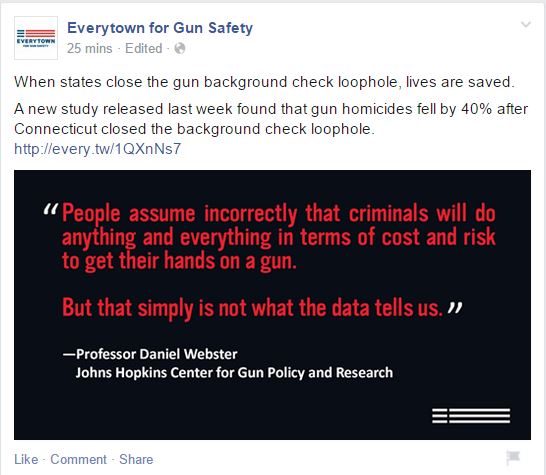In a study released Thursday in the American Journal of Public Health, they estimate that the law reduced gun homicides by 40 percent between 1996 and 2005. That’s 296 lives saved in 10 years
Source: Gun killings fell by 40 percent after Connecticut passed this law – The Washington Post
You see! UBC works! We told you that for a long time! Not like in Florida where we don’t have Universal Background Checks and the murder rate only dropped almost 40% since 1996…. wait, How’s that possible?
Well, it does not matter, Universal Background Checks will surely protect out kids against crazy people getting their hands on those terrible “assault weapons.” That way we can avoid massacres like Sandy Hook Elementary in Connecticut… you know what? Forget it.
Johns Hopkins Center for Gun Policy and Research, a Joyce Foundation funded front “dedicated to reducing gun violence by providing information on firearm injuries and gun policy; by developing, analyzing, and evaluating strategies to prevent firearm injuries; and by conducting public health and legal research to identify gun policy needs” and part and parcel of the Johns Hopkins Bloomberg School of Public Health.
Do I need say more?
UPDATE: Hot Air has a very detailed analysis of the article.


Hotair missed one really good one: Between 2003 and 2012, the gun-homicide rate in CT went UP. The 2012 is actually higher than the 1995 rate! (CDC data from the WISQUARS system)
Another Bloomberg paid for hit piece.
Texas is down more than 50% since 1995. That’s the year we passed shall issue concealed carry.
http://www.disastercenter.com/crime/txcrime.htm
That matches the Florida numbers since CWP too.
So what about the overall homicide rate in CT? Because of course fewer guns will result in fewer deaths from firearm-related injuries, but people were killing each other on this planet long before gunpowder was developed.
How do you quantify things that didn’t happen? They say they used computer models that compared CT to other states. The same sort of models that predicted that the Arctic would ice free and NYC underwater by now, thanks to global warming?
Hmmm… In 1994, Clinton passed the Omnibus Crime Bill, along with the “three strikes law.” Many states, included CT, added their own three strikes laws in the 1993-1995 period. The “Crack Epidemic” that started in 1984 had peaked and was officially over by 1995. The era of the “cocaine cowboys” has ended by the early 1990’s and cocaine was fast falling out of favor among the white glitterati and Wall Street. Mayor Rudy Giuliani got elected in 1993 on a platform of cleaning up NY, and broken windows style policing. This crackdown on NYC criminals had a ripple that reduced crime in the NYC commuter regions of NY, PA, CT, and NJ.
The internet boom started in 1993 and the dot com bubble really kicked off in 1997. Clinton engaged in welfare reform in 1996, Clinton took on the Japanese economy and trading practices in 1993 and helped restore a favorable balance of US trade. These two events were key in creating the “Clinton Economy” of the mid 90’s and record low unemployment.
Of the 296 lives saved, how many were saved because of background checks? How many were saved because some criminals in CT were put away for life on the third strike? Because the Wall Street execs in CT were no longer going to coke parties and their dealers were no longer fighting for territory? Because there were fewer crack heads committing crimes for drug money? Because petty criminals were being busted for peeing in dumpsters and squeegeeing car windows before escalating to mugging? Because the poor were getting hired during one of the biggest economic booms in the country’s history?
The point is: there were a number of social, economic, and political changes that took place in the early to mid 90’s, that all would have had an effect on lowering the crime rate.
I can’t see that guy’s name without being reminded of a short story that was required reading in school:
“The Devil and Daniel Webster”
Except that this time, Daniel Webster is not the good guy.
Nope, no agenda there… Pay no attention to the man behind the curtain… sigh….